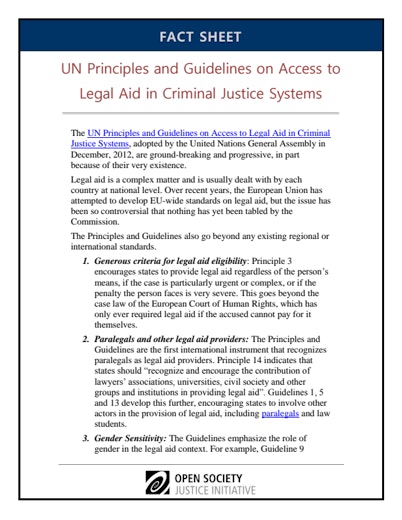The UN Guidelines and Principles on Access to Legal Aid in Criminal Justice Systems
The UN Principles and Guidelines on Access to Legal Aid in Criminal Justice Systems, adopted by the United Nations General Assembly in December, 2012, are the first international instrument to deal with legal aid.
They are also ground-breaking and progressive, in part because of their very existence.
Legal aid is a complex matter and is usually dealt with by each country at national level. Over recent years, the European Union has attempted to develop EU-wide standards on legal aid, but the issue has been so controversial that nothing has yet been tabled by the Commission.
The Principles and Guidelines also go beyond any existing regional or international standards.
- Generous criteria for legal aid eligibility: Principle 3 encourages states to provide legal aid regardless of the person’s means, if the case is particularly urgent or complex, or if the penalty the person faces is very severe. This goes beyond the case law of the European Court of Human Rights, which has only ever required legal aid if the accused cannot pay for it themselves.
- Paralegals and other legal aid providers: The Principles and Guidelines are the first international instrument that recognizes paralegals as legal aid providers. Principle 14 indicates that states should “recognize and encourage the contribution of lawyers’ associations, universities, civil society and other groups and institutions in providing legal aid.” Guidelines 1, 5, and 13 develop this further, encouraging states to involve other actors in the provision of legal aid, including paralegals and law students.
- Gender sensitivity: The Guidelines emphasize the role of gender in the legal aid context. For example, Guideline 9 encourages states to incorporate “a gender prospective into all policies, laws, procedures, programmes and practices relating to legal aid to ensure gender equality and equal and fair access to justice.” It also states that states should take active steps to ensure that “where possible, female lawyers are available to represent female defendants, accused and victims.”
- Victims and witnesses: Particular attention is paid to the needs and rights of victims and witnesses in criminal matters. Principles 4 and 5 encourage states to provide legal aid to victims of crime and witnesses in appropriate cases. On top of this, Guidelines 7 and 8 state that the views and concerns of victims and witnesses should be presented and considered at appropriate stages of the criminal justice process, acknowledging that they may have an important role to play in a fair criminal justice system.
- Education and information: The Principles and Guidelines also stress the importance of ensuing that the public is well-informed of their right to legal aid, as well as about the criminal justice system generally. This goes further than any instrument or jurisprudence before it, providing detailed guidance about how the state can best educate its citizens about their rights. Guideline 2 encourages states to make information about the right to legal aid, how to access it, and what it consists of, available “in local government offices and educational and religious institutions and through the media, including the internet, or other appropriate means,” as well as “radio and television programmes” and “regional and local newspapers.”
The Principles and Guidelines were clearly drafted with a keen sense of the controversies and difficulties in providing legal aid around the world. They attempt to provide valuable detailed guidance about best practices, in some cases stretching beyond what any international document has done before.
For more information about the Justice Initiative’s work on legal aid and the Global Campaign for Pretrial Justice, please see: www.pretrialjustice.org
Topics
- Climate Justice
- Digital Rights and Fair Elections
- Discrimination and Racial Justice
- International Crimes
